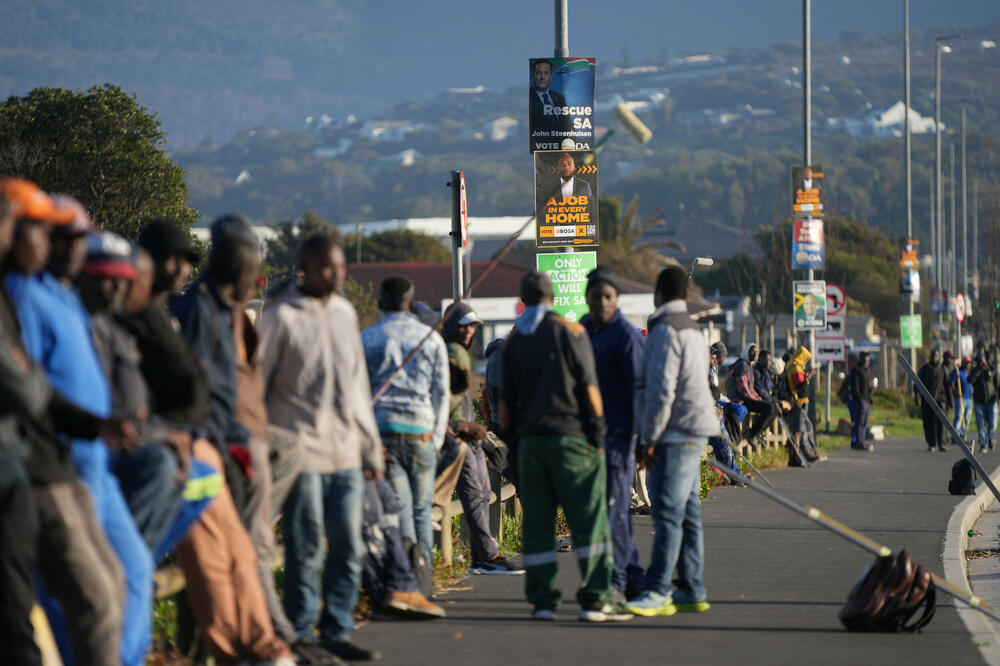Thirty years after the end of apartheid, South Africa is a democratic but deeply divided society. Political divisions fueled growing disillusionment with Nelson Mandela's liberation party, the African National Congress (ANC), which won the 1994 election on a promise of "a better life for all".
However, for many, that promise did not come true. The latest polls predict that in the elections at the end of May, the ANC will probably lose its parliamentary majority in the government for the first time due to high unemployment and inequality, the world media write.
"Shaded" Freedom Day
South Africa marked 30 years since the end of apartheid and the birth of its democracy with a solemn ceremony in the capital. However, any sense of celebration of this significant anniversary was contrasted with growing discontent with the current government, the Associated Press (AP) points out.
As head of state, President Cyril Ramaphosa presided over the rally in Pretoria, speaking also as leader of the African National Congress party, which is widely credited with liberating South Africa's black majority from a racist system of oppression that made the country a pariah for nearly half a century.
The ANC has been in power since the first all-race democratic elections on 27 April 1994, the vote that officially ended apartheid. However, according to the AP, the Freedom Day holiday was overshadowed by gloomy forecasts ahead of perhaps the most important election since 1994. Analysts and polls predict that the party's low popularity is likely to lose its parliamentary majority for the first time in the May 29 vote.
The 1994 elections changed South Africa from a country where non-whites were denied basic freedoms, not just the right to vote. Laws controlled where they lived, where they were allowed to go each day, and what jobs they could have. After the fall of apartheid, a constitution was adopted that guarantees the rights of all South Africans regardless of their race, religion, gender or sexuality. However, the AP points out, this has not significantly improved the lives of millions, as the majority of black people in South Africa, who make up more than 80 percent of the total population of 62 million, are still largely affected by severe poverty while the official unemployment rate, at 32 percent, the highest in the world. Although the damage from apartheid remains difficult to undo, the ANC is increasingly being blamed for South Africa's current problems.
In the week leading up to the anniversary, countless South Africans were asked what 30 years of freedom from apartheid meant to them. The dominant response was that while 1994 was a historic moment, it is now overshadowed by the unemployment, violent crime, corruption and near-collapse of basic services such as electricity and water that plague South Africa in 2024.
Ingrained inequalities
When South Africa's apartheid government was overthrown, ending white minority rule, people around the world shared excitement and optimism that a more just society would emerge, the New York Times writes, pointing to broader lessons for new generations about how difficult it is to reverse entrenched inequalities and manage complicated country.
No one doubts that South Africa has made progress in the past three decades, the paper wrote, noting that democracy has resulted in the growth of the middle class, access to better education across racial lines and recognition of basic human dignity for the black majority.
However, the paper pointed out, there has also been a widening gap between the rich and the poor, with many saying that black South Africans have gained political freedom but not economic freedom, and that they remain trapped in the apartheid structure.
Although democracy is stable, South Africans are disillusioned and the majority no longer vote, the New York Times pointed out, noting that voter turnout in the country has dropped by 86 percent. Although the integrity of electoral contests has never been seriously questioned, the enrichment of ANC members at a time when the majority of the population barely earns enough to feed themselves has shaken the faith of many South Africans in their democratic system.
Society is free and equal on paper, but economic barriers persist, the paper points out, pointing to the assessment of the World Bank, which ranked South Africa as the most unequal country in the world. Ten percent of the population holds about 71 percent of the country's wealth, while the other 60 percent hold only seven percent of the assets.
On top of that, the paper adds, much of the wealth remains in white hands, while economists say the country's economy has never advanced enough to allow for a greater redistribution of wealth. Research shows that white South Africans still own most of the land, while at the same time, black South Africans are unemployed at a much higher rate than their white counterparts, and this disparity has not improved over time.
Poverty has decreased since the beginning of democracy but remains a concern, the New York Times pointed out, adding that the latest available data shows that almost two out of every three black South Africans lived below the poverty line in 2015, meaning they had access to less than about $80 a month. Only one percent of white South Africans live below that line.
Despite education being open to all, the quality of education is a problem as well as significant racial disparities. In the 1950s, only ten percent of black children graduated from high school. By 2021, that number has risen to 58 percent, according to government statistics.
In 1982, the apartheid government spent roughly $1.100 a year on education for each white child, but only $140 for each black child, according to Department 27, a human rights organization. By 2018, that had risen to about $1.400 for each child, much of it aimed at leveling the playing field for black students, according to researchers at Stellenbosch University.
However, schools are still failing many of their students. A report published in 2022 found that 81 percent of fourth-grade elementary school students could not understand what they were reading.
And while more kids are graduating from high school, there aren't enough college spots to meet the demand. In 2022, about six percent of South Africans aged 18 to 29 were enrolled in higher education, according to Statistics South Africa. These enrollment rates, the paper points out, lag behind countries with similar sized economies, such as Brazil, Mexico and the Philippines, according to World Bank data.
Achievements that should not be overlooked
Looking back over the past 30 years, the assessment of the state of Mandela's "rainbow nation" is sobering: the economy in the Cape of Good Hope is in poor shape, society is still divided along racial lines while the gap between rich and poor has continued to grow. However, there were also some important achievements, at least on paper, wrote Deutsche Welle.
Fredson Gilengu, program director for southern Africa at the Rosa Luxemburg Foundation in Johannesburg, said the country at least "succeeded in introducing one of the most progressive constitutions in the world, establishing an independent judiciary, a free press, free and fair elections."
Gilengu also highlighted the fact that South Africa's constitution is the first in the world to prohibit discrimination based on sexual orientation and that the country has become the fifth country in the world — and the first in Africa — to allow same-sex marriage. In addition to these great gains, South Africa has also built a strong and active civil society over the past 30 years that is vocal in defending its rights in the face of adversity.
However, in recent years that trouble seems to come mostly from the highest levels of government. Power struggles and reports of corrupt interests within the ruling ANC have repeatedly set the country back. According to economic analyst Daniel Silke, there is a sense of deep disillusionment with the perceived inability of the main liberation party to govern the country.
Critical observers, however, have also emphasized that not every social ill can be attributed to the mismanagement of the country under the ANC.
Verne Harris, executive director of the Nelson Mandela Foundation, believes that the question is whether three decades is enough time to erase the trauma and legacy of the long and deep processes of colonialism and apartheid.
In addition to numerous domestic issues, South Africa wants to position itself as an advocate of oppression at the global level, especially after its decades of apartheid experience, Gilengu said, adding that he believes that despite its many problems, South Africa has made progress on the global diplomatic stage.
The country leads peace initiatives, sending troops to countries in the region to quell unrest and bringing high-profile cases to international courts. In late December 2023, South Africa accused Israel of violating international treaties, mainly the UN Genocide Convention, during the Gaza conflict, arguing its case before the International Court of Justice in The Hague.
Bonus video:





